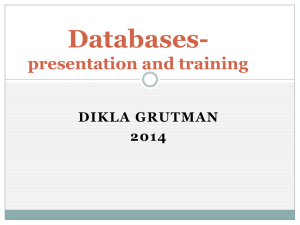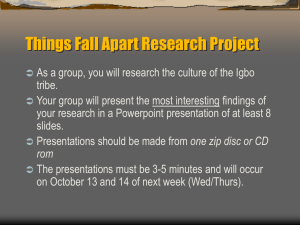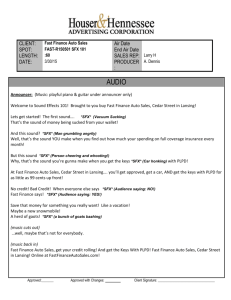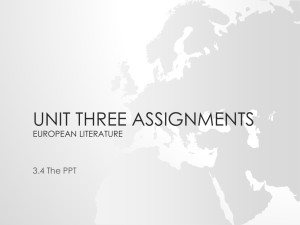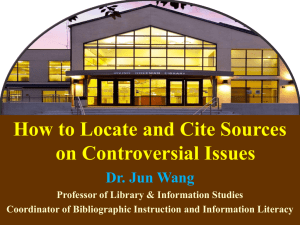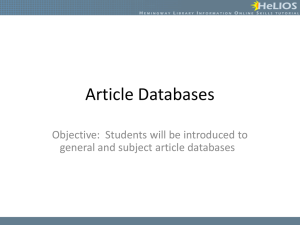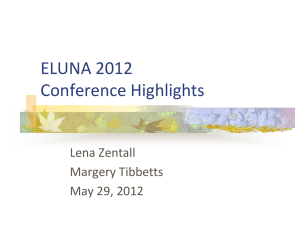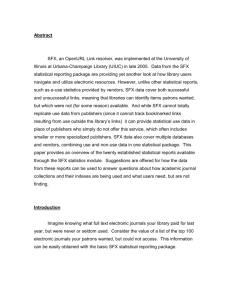catalog_and_databases_EDS_english
advertisement
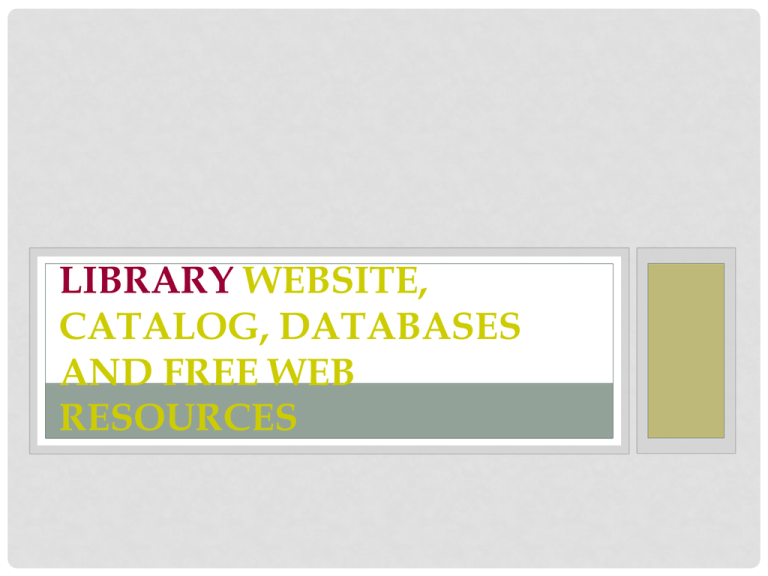
LIBRARY WEBSITE, CATALOG, DATABASES AND FREE WEB RESOURCES THE LIBRARY WEBSITE HTTP://WWW.AGRI.HUJI.AC.IL/LIBRARY/MENU.HTML 2 ACCESSING THE CATALOG AND DATABASES 3 THE CATALOG- ACCESSING BOOKS 4 THE CATALOGTHE LIST OF THE RESULTS Limit options Items received Sort options By library Record- a brief view of the item By material type By language 5 THE CATALOGA RECORD Additional terms for subject search Status and availability Location at the library 6 THE CATALOGACCESSING E-BOOKS Identify an E-book on the list Link directly to the E-book 7 JOURNALS IN THE CATALOG • Journals appear in the catalog alphabetically, by title. • The notice (Journal + Ejournal) means we have hard copy and access to electronic version. • The electronic journals of Hebrew University are managed by a software called SFX. • The link connects directly to the SFX. 8 SFX Each “GO” connects to full-texts of articles of this journal 9 DATABASES Databases contain information gathered from thousands of scholarly journals, books, book series, reports, conferences, and more. Databases can be used for narrowing/ enlarging the research topic, verifying citations, and protocols/ patent search. Some databases contain references cited by the authors of the articles and thus can be used for cited reference searching. This type of search enables the user to find articles that cite a previously published work. Some databases contain citation measuring and ranking of every scholarly journal in its subject area. 10 HOW TO SEARCH DATABASES? • Choose keywords for your search • Combine the keywords using: - Boolean operators - Truncation (*) - All synonyms/ forms of spelling/ grammar forms/ abbreviations or full phrase options. 11 DATABASES- BOOLEAN OPERATORS 12 DATABASES- KEYWORDS Truncation Synonyms Forms of spelling Grammar forms Abbreviations Safe* => safe, safety women OR females color OR colour shelf life OR shelflife BMI OR body mass index 13 BACK TO SEARCHING… 14 THE LIST OF THE RESULTS Go to “advanced search” to add terms 15 ADVANCED SEARCH SCREEN 4. 1. Click to select a field, where you search your term 2. Insert terms to search using boolean operators, truncation, synonyms, acronyms or full phrase etc. 3. Add a row for additional fields in your query 16 THE LIST OF THE RESULTS: Refine the search. Sort again the list. Select records for future printing/emailing/saving/exporting. Save query for future alerts/ RSS. Save query for future re-run. Locate full-text of items from the list. 17 REFINING THE SEARCH Additional (optional) limiters: Limit to a specific database Limit range of years 18 SORT AGAIN THE LIST Click to sort the list of the results again, according to a selected criterion 19 SELECT RECORDS FOR FUTURE PRINTING/ E-MAILING/SAVING/EXPORTING 2. Click to see the list of the records you selected 1. Click, for every record you need to save for future use 20 SELECT RECORDS FOR FUTURE PRINTING/ E-MAILING/SAVING/EXPORTING Choose how to manage the selected records 21 SELECTED RECORDS- PRINTING 3. Click and follow the instructions 1. Select detailed or brief format of the record 2. Select the citation format you need 22 SELECTED RECORDS- E-MAILING 23 SELECTED RECORDS- SAVING 1. Select/ customize format 3. Click to save and follow the instructions 2. Choose citation format 24 SELECTED RECORDS- EXPORTING 2. Click and follow the instructions 1. Choose the bibliographic management tool you use 25 SAVE QUERY FOR FUTURE ALERTS/ RSS Choose: Alert Or RSS 26 SAVE QUERY FOR FUTURE ALERTS/ RSS For e-mail alert register here For RSS click here and follow the instructions Save and follow the instructions 27 SAVE QUERY FOR FUTURE RE-RUN 28 SAVE QUERY FOR FUTURE RE-RUN 1. Select the query you need to save 2. Click to save 3. Log in or create an account (and log in) 29 LOCATING FULL-TEXTS OF ARTICLES • Use SFX to access full-texts of articles or to locate a hardcopy of the journal in the library. • Order from external library, using ILL (Inter Library Loan) service of the library. ILL requires payment. • (Optional- try to contact the writer of the article, when contact options are mentioned at the record) 30 LOCATING FULL-TEXT VIA SFX Click the title you need 31 LOCATING FULL-TEXT VIA SFX Go to SFX for full-text Optional: contact the author 32 LOCATING FULL-TEXT VIA SFX Link to full-text via this site 33 IMPACT FACTOR • The impact factor (IF) of an academic journal is a measure reflecting the average number of citations to recent articles published in the journal. It is frequently used as a proxy for the relative importance of a journal within its field, with journals with higher impact factors deemed to be more important than those with lower ones. • Impact factors are calculated yearly for those journals that are indexed in the JCR. • The impact factor was devised by Eugene Garfield, the founder of the Institute for Scientific Information. 34 FIND THE IF Go to JCR for information about Impact Factor 35 FIND THE IF IN JCR (JOURNAL CITATION REPORTS) Go to additional information about the IF of the journal Journal Impact Factor Journal ranking 36 WEB OF SCIENCE- CITED REFERENCE SEARCH FIND THE ARTICLES THAT CITE A PERSON'S WORK 37 WEB OF SCIENCE- CITED REFERENCE SEARCH Select 38 WEB OF SCIENCE- CITED REFERENCE SEARCH Select Search for articles that cite a specific article/writer 39 WEB OF SCIENCE- CITED REFERENCE SEARCH Enter author name Enter abbreviated journal title Optional: add volume, issue, pages. Enter year 40 WEB OF SCIENCE- CITED REFERENCE SEARCH Click to see the list of the 3 citing articles 41 WEB OF SCIENCE- CITED REFERENCE SEARCH THE LIST OF THE RESULTS Every item in the list is an article citing an author in a specific journal between specific years, as defined in the query 42 FREE WEB RESOURCES HTTP://WWW.AGRI.HUJI.AC.IL/LIBRARY/NEW_RESOURCES.HTM • US Patent and trademark office • Google Scholar • HighWire • Scirus • Faostat • Ag BioTech InfoNet • Agricola • Agris • Medline/Pubmed 43 FREE WEB RESOURCES- AGRICOLA 1. Select 2. Link to database 44 FREE WEB RESOURCES- AGRICOLA 45 FREE WEB RESOURCES- RESEARCH4LIFE • Document Delivery Now Available free of copyright fees to registered Research4Life Institutions in the UN's 48 Least Developed Countries • http://www.research4life.org/ 46 CONCLUSION- THE WEBSITE OF THE LIBRARY: • Search and locate books in the library • Search articles: combine keywords (using Boolean operators, truncation etc.), manage the list of the results according to your needs, locate the full-text • Find IF (Impact Factor) of a journal • Use Cited Reference Search in Web of Science • Search in free web resources 47
